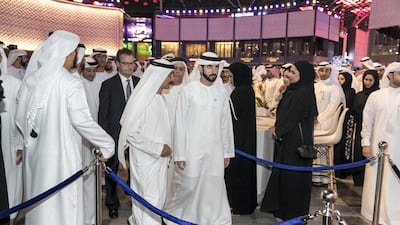A high-speed transport network which aims to slash global commuting times is on track to bring its advanced technology to India.
UAE-backed Virgin Hyperloop will assess plans to develop a super-fast route from Kempegowda International Airport to Bengaluru - the country's sprawling tech hub.
The hi-tech system is comprised of pods which can transport passengers or cargo at speeds in excess of 1,000kph, roughly three times faster than conventional high-speed rail.
An agreement was signed between Sultan Ahmed bin Sulayem, chairman of Virgin Hyperloop, and TM Vijay Bhaskar, chairman of the board of directors at Bengaluru airport, to launch a pre-feasibility study for the project.
"Beyond just the transit of passengers, airports are crucial conduits for goods, especially time-sensitive deliveries," said Mr bin Sulaymen, also group chairman of DP World.
"A hyperloop-connected airport would dramatically improve the delivery of cargo and create an ultra-efficient supply chain."
The research will focus on technical, economical and route feasibility and is expected to take 12 months to complete.
Preliminary analysis found Hyperloop technology could transport thousands of passengers from the airport to the city centre in under 10 minutes - compared to more than 45 minutes by road.
Virgin Hyperloop is working to turn a grand transport dream into the reality with the support of the Middle East.
The company has partnered with Dubai's Roads and Transport Authority to drive forward plans to utilise hyperloop technology on a route between Abu Dhabi and Dubai.
The ambitious scheme would reduce travel times from roughly an hour by road to just 12 minutes.
Abu Dhabi's Mohamed bin Zayed University of Artificial Intelligence (MBZUAI) signed a preliminary agreement with Virgin Hyperloop in June to collaborate on research to develop the futuristic transport system.
“Virgin Hyperloop will change the way we move around the world," Dr Sultan Al Jaber, the university's chairman, said at the virtual signing.
"MBZUAI will help enable this by providing access to some of the world’s most talented AI professionals, as well as superior research facilities, which can contribute to realising Virgin Hyperloop’s vision.”
In March, Saudi Arabia issued a trade licence for the company following a national pre-feasibility study on using hyperloop technology to transport people and goods. The study found a hyperloop would cut the travel time from Riyadh to Jeddah to only 46 minutes.
DP World, the Dubai-based ports operator, and the Abu Dhabi Capital Group are also major investors in the firm, with DP World's chairman and chief executive Sultan Bin Sulayem also serving as chairman of Virgin Hyperloop.
In July, the US House of Representatives passed legislation calling for regulatory framework for the safe use of hyperloop systems, a move praised by Dubai ports operator DP World, the largest investor in Virgin Hyperloop.
The Non-Traditional and Emerging Transportation Technology Council in the US is expected to issue guidance in the next six months to set out a clear regulatory framework for the industry.
“The decision is a huge vote of confidence that we are all on the right side of history,” said Sultan bin Sulayem at the time.
“The move, which brings hyperloop systems one major step closer to reality, validates our decision to take this technology seriously and support this innovation.”








